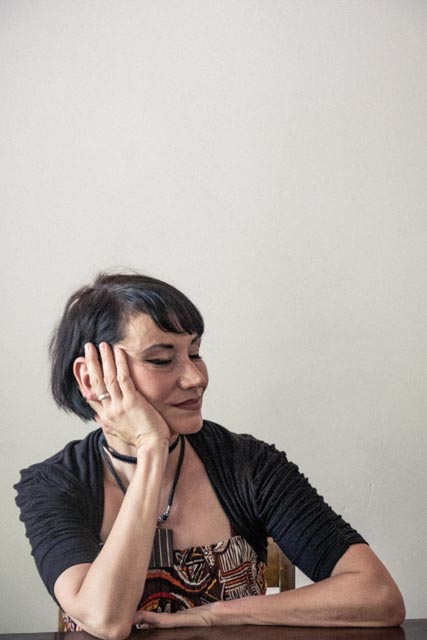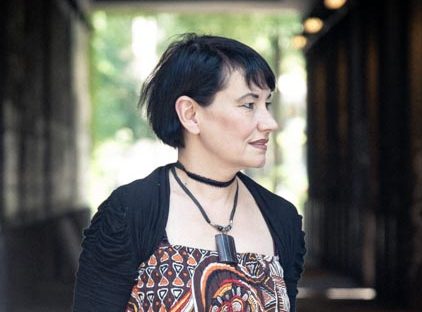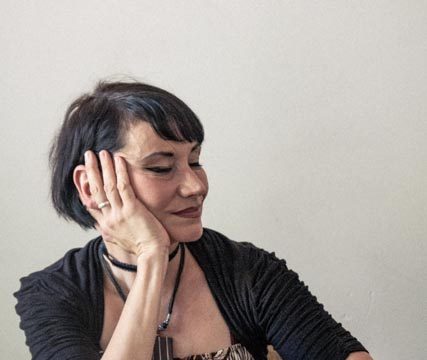Serbia, Literature, 2018
Ana
Ristović

Serbia is ultimately still a blank spot on the literary map. The fame of authors like Ivo Andrić or Bora Cosić, Danilo Kiš or Aleksandar Tišma has not changed that either. However, their names might not be of help anyway if one wanted to try to categorize the work of poet Ana Ristović, born in 1972 in Belgrade. At least her German translator Fabjan Hafner is also convinced of this: “She actually has no peers,” says Hafner in his loving epilogue to Ana Ristović’s collection of poems So dunkel, so hell, published in German in 2007.
Ristović—who studied the Serbian language, literature, and comparative literature in Belgrade, moved to Ljubljana in 1998 for six years, and returned to Belgrade in 2004 where she still lives today—had her debut at the age of eighteen with the collection Snovidna voda (1994, t: Dream water). This was awarded ad hoc the Branko Radičević Prize for the best Serbian poetry debut. Her other publications—to date there are nine collections of poetry—have all been awarded prizes. In 2005, she was also awarded the Hubert Burda Prize for young Eastern European poetry; in the same year she was the recipient of a residency fellowship at the Literary Colloquium Berlin. In 2010, she was a guest of the International Literature Festival Berlin, and, in 2016, a guest of the International Poetry Festival Berlin. Her poetry has been translated into various languages and published in numerous journals and newspapers, including Akzente, Schreibheft, Lichtungen, or Manuskripte. At the same time, she has made a name for herself as a translator. As a poet—who has long since turned her back on the irksome duties of a poet docta—her credo is: “To write so at least one of the verses trembles like it means it.” (So dunkel, so hell, 2007, dt. Fabjan Hafner). Indeed her lyricism literally gets under the skin. Like an open-heart surgery, her poems dissect the fears of the poetic ego: the fear of old age and infirmity, of loneliness and too much closeness, of everyday life and its vagaries, of too much silence and of superfluous words, of writing and the persona who goes by the name of Ana Ristović. In seemingly casual parlando, Ristović thus draws attention to various masks of the feminine in linguistic and precisely delineated images—and not without a hint of irony—situated between stasis and change, emancipation and resignation. Here, her poetic self has no fear of contact: a half-eaten popsicle clumps on a stocking seam, deep-frozen cabbage rolls sprout tiny breasts, emptiness cuts the skin “like a dull knife,” a four-leaf clover grows out of tiny bird droppings. The quirky always cants toward the surreal and wonderful, any woman’s handbag might be concealing a bomb. In other words: in Ristović’s lyrical cosmos nothing is secure, everything is transitory. As such, her poems move through the peripheral zones of a “chiaroscuro,” where dark and light close in on one another indiscernibly and light and shadow also blend into lyrical emotional states. And Ristović’s language is accordingly multicolored: she has a range of tones, sounds at times childishly naïve, at times coquettish and seductive—but the tonality always proves to be vibrant and willful. Nothing is lamentation or regret—everything begins by soberly and accurately describing what’s now and is. Ristović almost always proceeds from concrete observations—only to surprise in the concluding verse with an abstract generalization, turning the focus unexpectedly outward: “If you see a hedgehog, you say: Look, a hedgehog! / And his spines become / tiny grenade launchers” ends her poem Städtische Müllkippe (published in German in So dunkel, so hell, 2007. Dt Fabjan Hafner), for example. To this extent, her poems tend to verge on prose—in any case one searches in vain for rhymes in her work—and they tell stories with deliberately irking corners and edges: a simple spot on the window turns into a miniature fish, her own apartment becomes alien. Like radar, her poetic ego scans all facets of life’s reality and the world of things in order to transform the ostensibly profane into poetically embellished images: “A spit-out cherry stone contains for me an entire cosmos of coming and going,” the author writes in her own short epilogue to So dunkel, so hell (2007). Ristović—among the most widely translated contemporary Serbian poets—signals a new direction in contemporary Serbian poetry. In a country where—as she once mockingly remarked in the Serbian newspaper Blic—only “a dead author is a good author,” her incorruptible voice provides poetic fresh air. She knows: “Like love, poetry does not tolerate a lie.” (Ristović, 2007)
Text: Claudia Kramatschek
Translation: Erik Smith
So dunkel, so hell.
Poem. From the Serbian by Fabjan Hafner.
Jung und Jung Verlag, Salzburg 2007.



